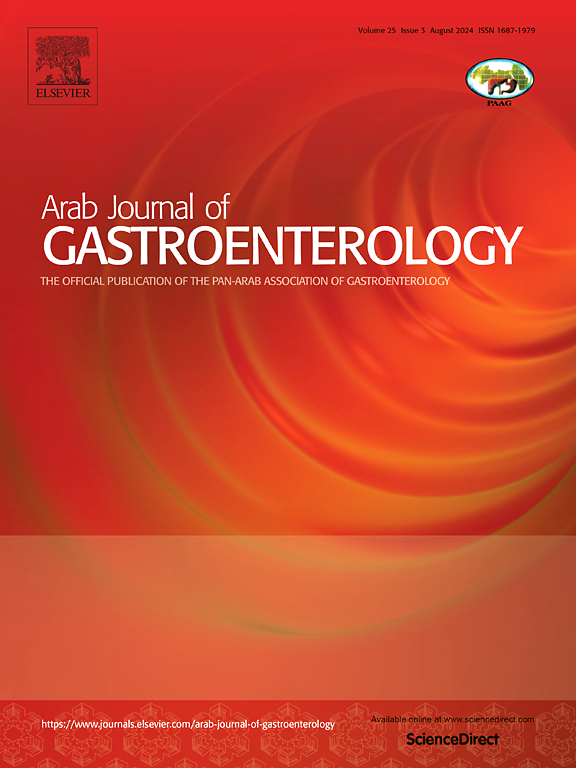Population based treatment strategy of H pylori in Qatar: Through clinical and demographic insights
IF 1.1
4区 医学
Q4 GASTROENTEROLOGY & HEPATOLOGY
引用次数: 0
Abstract
Background and study aim
Helicobacter Pylori (H. pylori), a widespread gastric pathogen, can have a range of presentations necessitating population based tailored treatment strategies. We aimed to study the clinical and demographic profile of patients with H pylori in Qatar, to determine the best treatment strategy for Qatar’s population.
Patients and methods
Retrospective data collection of all patients diagnosed with H pylori from January 2017 to December 2019 in Hamad Medical Corporation (HMC) and Primary Health Care Corporation (PHCC), Qatar was done. The demographic, clinical, endoscopic and histologic characteristics of patients and H. Pylori directed therapies were documented and compared. Pearson’s Chi-square test, independent samples ttest or analysis of variance (ANOVA) was used as appropriate to compare various parameters between patients.
Results
2217 patients tested positive for H. Pylori over 3 yrs. of which 837 (37.8 %) were Qatari nationals. Dyspepsia was the most common indication for testing (44.6 % patients) which was positively associated with gastric erythema and atrophy on endoscopy (P = 0.000 and 0.004, respectively) and negatively associated with a normal endoscopy (p = 0.038). Most of the patients had chronic active gastritis (98.2 %). Other pre-malignancies were seen in only 85 (14.3 %) patients. Mean (SD) age of patients with premalignancies was significantly more than those without [ 53.25 (17.6) vs. 44.77 (14.8), p = 0.000]. Only 11(0.6 %) patients had a malignancy of the stomach.
Conclusion
H pylori infection may be quite prevalent amongst Qatari nationals. Since prevalence of gastric premalignancies and incidence of gastric malignancy in patients with H pylori in Qatar may be low, generalized test and treat strategy is not economically and practically meaningful in Qatar. Symptomatic patients should be tested and treated, with endoscopy reserved for those with alarming symptoms, failure of proton pump inhibitors and older patients.
卡塔尔基于人群的幽门螺杆菌治疗策略:从临床和人口学角度看问题。
背景和研究目的:幽门螺杆菌(H. pylori)是一种广泛存在的胃部病原体,其表现形式多种多样,因此需要针对不同人群制定不同的治疗策略。我们旨在研究卡塔尔幽门螺杆菌患者的临床和人口统计学特征,以确定适合卡塔尔人口的最佳治疗策略:我们对卡塔尔哈马德医疗公司(HMC)和初级卫生保健公司(PHCC)2017 年 1 月至 2019 年 12 月期间确诊的所有幽门螺杆菌患者进行了回顾性数据收集。记录并比较了患者的人口统计学、临床、内窥镜和组织学特征以及幽门螺杆菌指导疗法。结果:3 年来,2217 名患者幽门螺杆菌检测呈阳性,其中 837 人(37.8%)为卡塔尔国民。消化不良是最常见的检查指征(44.6% 的患者),与内镜检查中的胃红斑和萎缩呈正相关(P = 0.000 和 0.004,分别为 0.000 和 0.004),与内镜检查正常呈负相关(P = 0.038)。大多数患者患有慢性活动性胃炎(98.2%)。只有 85 例(14.3%)患者患有其他恶性肿瘤。前恶性肿瘤患者的平均(标清)年龄明显高于非前恶性肿瘤患者[53.25 (17.6) vs. 44.77 (14.8),P = 0.000]。只有 11 例(0.6%)患者患有胃部恶性肿瘤:结论:幽门螺杆菌感染在卡塔尔人中可能相当普遍。结论:幽门螺杆菌感染在卡塔尔国民中可能相当普遍。由于卡塔尔幽门螺杆菌感染者胃癌前病变的发病率和胃恶性肿瘤的发病率可能较低,因此在卡塔尔采取普遍的检测和治疗策略并不具有经济和实际意义。有症状的患者应接受检查和治疗,而内镜检查则应保留给那些症状令人担忧、质子泵抑制剂无效和年龄较大的患者。
本文章由计算机程序翻译,如有差异,请以英文原文为准。
求助全文
约1分钟内获得全文
求助全文
来源期刊

Arab Journal of Gastroenterology
Medicine-Gastroenterology
CiteScore
2.70
自引率
0.00%
发文量
52
期刊介绍:
Arab Journal of Gastroenterology (AJG) publishes different studies related to the digestive system. It aims to be the foremost scientific peer reviewed journal encompassing diverse studies related to the digestive system and its disorders, and serving the Pan-Arab and wider community working on gastrointestinal disorders.
 求助内容:
求助内容: 应助结果提醒方式:
应助结果提醒方式:


